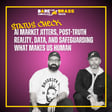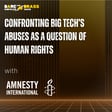
What a Ransomware Attack on a Hospital Really Mean (Audio Issue Fixed)
RE-ISSUE: This recording corrects for an audio overlap problem in the previous version of this interview at the 28:00 mark.
Zach Lewis, CIO/CISO at University of Health Sciences and Pharmacy in St. Louis, joins the show to talk about his experience with a ransomware attack by the LockBit group.
Zach takes us beyond the technical recovery into territory most people don't talk about: the gut-punch moment of finding the ransom note and the months of running on pure adrenaline while keeping his team from cracking under pressure.
Key takeaways from our conversation:
The human toll matters. When hospital systems go down, it's not just inconvenient. People can't get medications, emergency rooms have to reroute patients, and lives are at stake. This is the cyber war nobody wants to acknowledge.
Attribution is nearly impossible. Even when you know who attacked you, there's rarely closure for victims.
Leading through crisis. Zach shares how he kept his team together during months of remediation by staying calm on the outside, and knowing which team members could handle the pressure and which ones needed to stick to routine work. Sometimes the best leadership is just being that steady presence when everything else is chaos.
If you want to understand what really happens when ransomware strikes, this episode is required listening.
Available wherever you get your podcasts.
Zach's book "Locked Up" drops January 6th and is available for pre-order now: https://www.amazon.com/dp/1394357044
Mentioned:



















